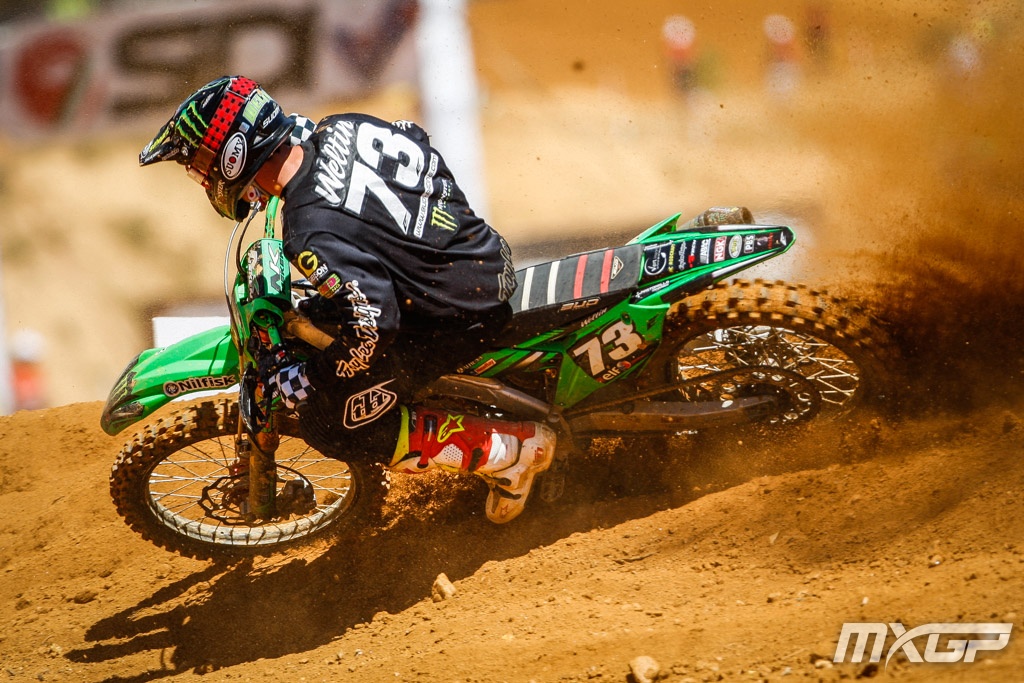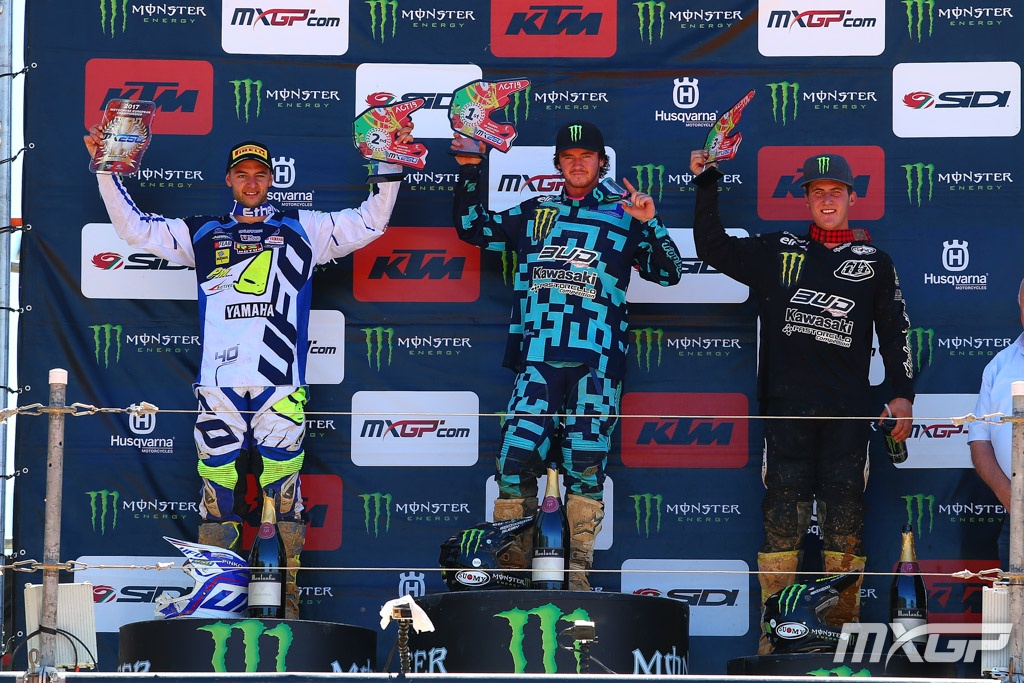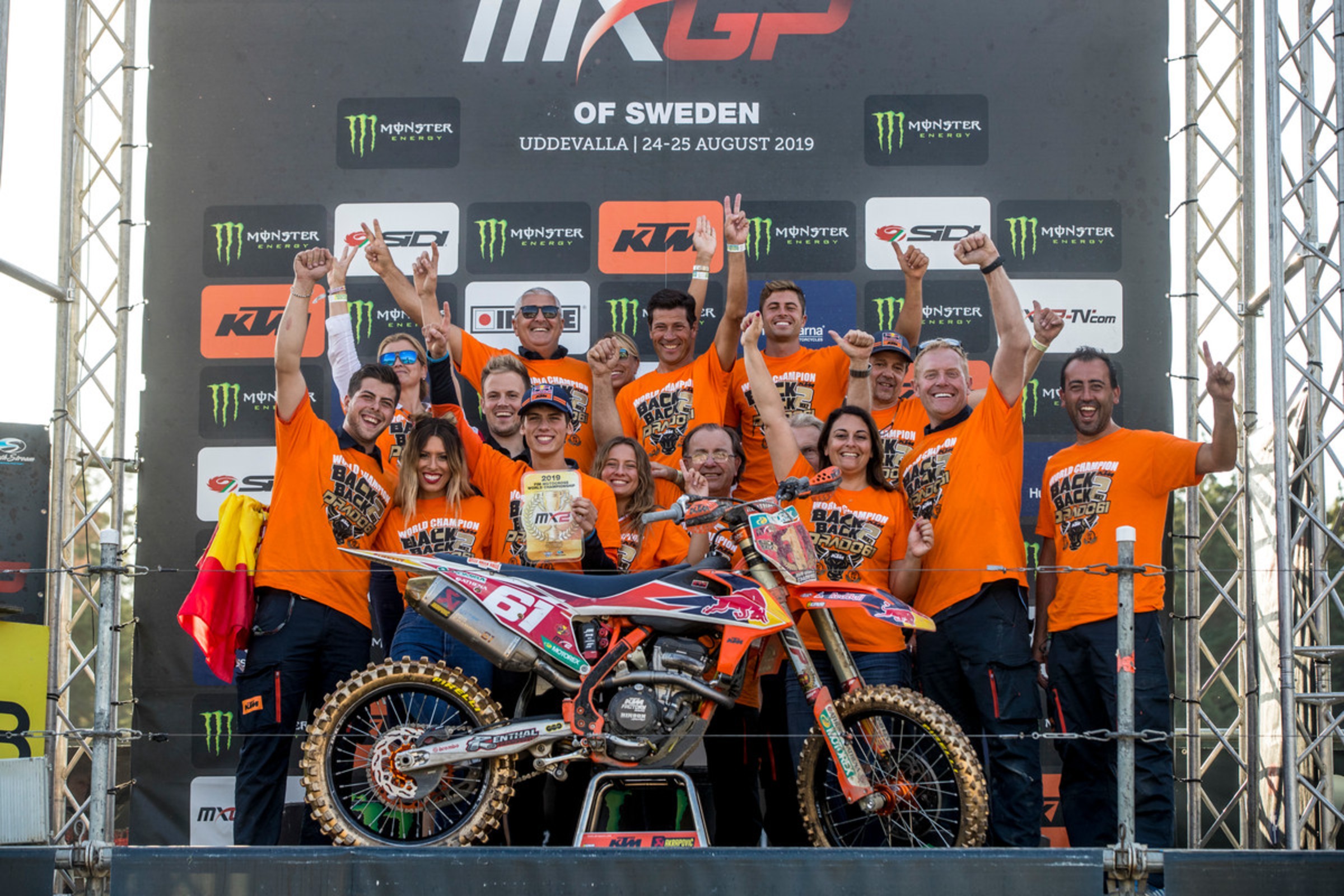Michigan’s Marshal Weltin rode just under the radar as an amateur, running up front in his later years on big bikes but never grabbing that elusive championship—he finished second overall to Benny Bloss in Open Pro Sport in 2015. Then he hit the road as a privateer, trying to make a name for himself and find a ride. He ended up getting a good one, but with a twist: he had to move to Europe. Weltin spent the 2017 season racing for Bud Racing Kawasaki and living in France. He finished sixth in points in the EMX250 class, and will move to MX2 for 2018 with Vamo Honda.
We ran into Weltin recently during his brief visit back to the States and asked him about his experience. As you read this, he is on a plane headed to Belgium.
Racer X: So you’re headed back to Europe. How often are you actually in the U.S.?
Marshal Weltin: Well, I was fortunate to come home and visit my family here for a couple of months, but I signed a deal to go back to Europe for next year and I leave this week. I’m going to Belgium now, and if everything goes as planned, I’ll be there for about a year. I’ll be there for the full MX2 season.
You went nine months this year without coming back to the U.S.?
[Laughs] Yeah. Now that I say it, it sounds like a long time, but with all of the racing we did and all of the traveling, it flew by. I raced at least three out of four weekends from April to October, so that makes things go by quick. But I was definitely happy to see my family when I got back. Everything over there was supplied for me, and we had a lot of races to do. In between GPs we’d do French Nationals, which are kind of a combination of a big local race or a full-on GP. They get decent spectators for those, probably around 5,000 spectators per round, so it was good to do those.
So you were an amateur through Loretta’s 2015. You finished second in the Open Pro Sport class behind Benny Bloss. I’m sure the goal was to race professionally here. How did you end up going to Europe?
I had a full deal to race West Coast Supercross, but at the last minute, my buddy Darian Sanayei asked me if I was busy and had a deal together. I did, but he had talked to his old team—he had raced for Bud Racing—and they were looking for another rider. He asked if I was interested, and they sent me an email to see what I was doing. I thought it was an awesome opportunity and I jumped on it. It was from Darian—you have to know the right people, I guess.
Was Bud Racing going to support you in supercross, or did you know the deal just to race in Europe right from the start?
Yeah, I had my West Coast Supercross deal with another team, and I switched too late to do supercross with Bud. They wanted to make sure we were ready for the outdoor season over there.
Once you went there, how easy or how hard was the transition?
Yeah, I think I got a little lucky with the type of team I was on. They supplied everything, even a house to live in, and we had Wi-Fi right away which was great because our phones didn’t work at first. They gave us a vehicle, too. Took a lot of the confusion out of the way for us, but there was still a lot to adjust to. After a while, though, you realize it’s not that much different. Everyone gets up in the morning, goes to work, and then comes home to see their family. It’s all kind of the same. Just a few little things were different. In the EMX series I was doing, the way they do their qualifying is different. They have a free practice and timed qualifying all in one. It’s not a lot of track time before the race. The EMX class is usually very close on times, too. The difference between the fastest qualifier and not making it is usually two seconds in the one session that you get.
Let’s talk EMX. It’s not quite an amateur class, but it’s not the full GP MX2 class, either. Explain what it is and how it works to American fans.
Yeah. So basically it’s a full professional series, but it’s only in the European rounds of the GPs. It’s also quite a bit cheaper to race than the MX2 class. That makes it better for beginners who are coming right out of the amateurs, or for good pros who can’t afford to do the full MX2 championship. It’s still really difficult; I definitely struggled at times. You race as part of the GP weekend at the same venue, and you go out on the track before them. You’re kind of breaking the track in, and sometimes that’s frustrating. You go out in the EMX class and you get a fully-drenched track with lots of puddles and everything. We break the track in for the MXGP guys, but that’s what the EMX class is there for.
The points show you finishing sixth in EMX for the season. How did it go?
Yeah, I went into the last round in fifth, but had two DNFs, one due to a bike malfunction and another because of a crash. It was really muddy. I wished I could have come out with a top-five, but things didn’t go very good at all in that one.
Beyond the points, where you happy with your riding during the season, or was there a lot you had to learn along the way?
I don’t know. Just getting comfortable racing at a bigger venue, it’s just something that you can’t get used to until you actually do it. I turned pro at the end of 2016 and I raced a few outdoor nationals here, but for some reason, qualifying at those was never an issue for me. I don’t know why, but in Europe, maybe it was the culture shock or something, but qualifying and even some of the racing was tough for me at times. But it was a great experience. To go to races where every fan is speaking a different language, it was an adjustment, but also it was really fun.
Where you at all worried about getting a ride again for 2018?
I actually ended up switching teams. Bud Racing didn’t want to do an MX2 deal with me for 2018, I think they have a little tighter budget, but luckily I found a team in Belgium that was really looking for an MX2 rider. I didn’t ask for much as far as money; I just wanted a chance to prove myself. Also, I’ll be 22 next year, so this would be my last chance to race the MX2 class [due to the under-age-23 rule in the GPs].
Have you thought about where this might lead? Who knows, you might be in Europe for a long time.
[Laughs] Honestly, I haven’t thought about it that far. I’m just taking it year by year. I’m hoping it does lead to something positive, though, be it in Europe or the United States. I’m open for either.
Have you ever gotten a chance to race supercross in the U.S.?
I actually did Atlanta and Daytona. Then I got hurt and I wasn’t able to do it anymore. I actually really like supercross and I had trained for it a lot because I was expecting to race the West Coast. I trained for it a lot, [but] I just haven’t been able to race it much.
What’s the lifestyle like over there for a racer? I know when you lived here, you rode and trained at Club MX, which is the standard type of situation for a rider in America. How different was the riding part during the week?
I don’t think it could be more opposite. We were going to tracks that hadn’t been groomed in a long time and probably still won’t be touched for a few years after. You just kind of get used to it and you ride what you get. They don’t have the machinery and the watering to do it. That was in France, but where I’m moving to now in Belgium, there’s a lot more sand and they keep the tracks up a lot better. Belgium, you could kind of compare that more to being the Southern California of Europe. It’s like the Mecca of it, because that’s where all the teams are based and they have a couple of good sand tracks that they maintain during the week. In France, we had very limited tracks to ride. We’d drive over an hour to go to a minute lap time hard-packed track that hadn’t been prepped in forever. It was a lot different, but I think it made me a more diverse rider, for sure.
Were these all public tracks?
Some were, but most of the time you had to have someone you knew to get in there. The team manager would have to know the person and set something up ahead of time.
Compare having a ride in Europe to what you could have done coming out of amateurs, which was to try the privateer route or race for a smaller team. Going to Europe might be tough, but I’d think there were some other advantages to just being on a team instead of slogging through as a privateer back at home.
I really think I made the right decision, looking back on it, just because they did cover a lot of my costs and they really did a great job supporting me. It does seem like it’s hard to find that level of planning in an organization from a smaller privateer team back home. Usually everything is thrown together last-minute. Having that structure in Europe, I’d say is was a better experience for me.
Plus, you had an American teammate.
Yeah, I got lucky. Tristan Charboneau was my teammate, and his mechanic, Hayden. They’re both Americans and we ended up living together. That was good. We do have a little bit different style. He’s the kind of guy who can go fast no matter what he does, and I’m the guy who has to ride three days a week and train all the time and follow the perfect diet. I have to take it really serious, and he has that natural ability to just go. So we had different styles and different approaches, but it was good to have an American there.
Is this a coincidence that this team has supported you, Charboneau and Sanayei?
I don’t really know why. It’s kind of funny that a French team hired three Americans in a row, but I see now that they’ve signed two French riders. Maybe now they’re getting back to their roots a little bit.
What’s the new team?
Vamo Racing, a satellite Honda team. We’ll be doing the full MX2 World Championship.
What about seeing your family? How often does that happen?
That’s the hard part of living in Europe. I don’t get to see them much. My brothers came down here to North Carolina to visit and I even did a little local race in Asheville, North Carolina, and they came just to be able to hang out with me a little bit. Now I’m driving back to Michigan to see my parents for a few days before I go back. When I’m in Europe I talk to them every day using WhatsApp, but it’s just not the same.
At the end of the year, did you actually make money? Was this a profitable way to go racing?
Yeah, I was lucky enough to make a little money. Not a lot, but I was in the positive at the end of the year. If I didn’t have the team covering all of my expenses, my travel and my living and all the little stuff, I wouldn’t have been in the positive, but they did so I was able to save a little bit. I did spend some money just because the food was so good. It was hard not to eat out. The place where I lived in France, there were just so many restaurants and so many cool things to do. I just figured it was better to spend the money and enjoy the experience so I won’t say that I missed out on anything. This year will be a little different. I’ll try to be more frugal with everything. I hear you’re pretty tight with things, so you’d understand.
Exactly! I’d be eating peanut butter and jelly everything and then 10 years later, I’d really regret missing out on the experience. Okay, anyone else you want to thank?
I’d like to thank my family and friends. Chris Osborne, he hooked me up. I stayed in Charlotte during the past month and we trained together. It was cool to have a training partner and a friend for that, and he gave me a place to stay. Also my buddies Phil Nicoletti and Kyle Peters, they support me still when I’m back in Charlotte and it’s good to hang out with them. Of course, my family. They’re great and they’ve always supported me with everything I do.










